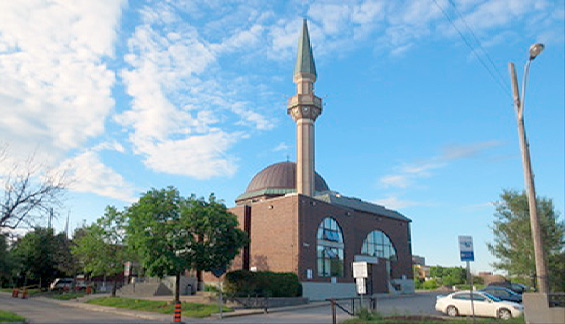Ramadan: A Brief Overview
From: Imam Abu Noman Tarek,
Muslim Community Brantford-Brant
I
slam (or submission to God) is one of the world’s three major religions and is the final link in the Judeo-Christian tradition of monotheism (Belief in One God). Fasting the month of Ramadan is one of the tenets of Islam. Ramadan is also the month in which Muslims believe that the Holy Quran (The Muslim’s Holy Book) was revealed to Prophet Muhammad. Healthy adults are expected to observe this month.
 |
Muslims follow a lunar calendar and Ramadan is the ninth month of the Islamic Calendar. A lunar year is about 11 days shorter than a typical Gregorian year. As a result, Ramadan “moves forward” about 11 days every year. Thus it can take place in the Spring, Summer, Fall or Winter.
Ramadan is a major event in the life of a Muslim. Ramadan helps the Muslim achieve a higher level of spirituality and it helps him or her achieve self-control. Moreover, it impresses on us the real plight of the poor and needy, not only by contemplating their fate and suffering, but also by getting a first-hand experience of their plight.
During Ramadan, Muslims fast from dawn to sunset every day. This means abstaining from food or drink or marital relations during daylight hours. The Muslim is expected to do his or her best to practice self-control and self-discipline; thus he or she should refrain from using harsh language or insults and should do his or her best to show forgiveness and respect to others. In addition, the Muslim is expected to do extra prayers, especially at night, and he or she is also expected to read and contemplate on the meanings of the Quran.
Fasting helps the Muslim to appreciate the endless bounties bestowed on us by God and it reminds us to be grateful to God and not to take for granted such essentials as food and drink. Fasting also helps us to feel more connected to those who are less fortunate than us and offer them a helping hand. Sharing with the poor is a natural outcome of this month. Muslims should also show more generosity and forgiveness to others. All these lessons should continue after this month is over and during the rest of the year. Fasting helps the Muslim not only to build a sense of self-control and willpower but it also teaches us to be more sensitive to the needs of those who are less fortunate than us. Ultimately, an uplifting of our spirituality should be a major outcome of this month.
The day after the month of Ramadan is over is a festive, and very joyous holiday known as EID-UL-FITR (the day of breaking the fast). In some countries this holiday is celebrated for three days. Children are often rewarded with gifts, money, new clothes and other goodies. On that day, a Thanks Giving Prayer is held in the morning.
In upholding the tradition that Muslims must do everything they can to support the needy, the poor and the weak, we are urged to take every opportunity to give a helping-hand to those who are in need. Indeed another pillar of Islam deals with charitable giving. To show that the Muslim has in fact learned the lesson of fasting, and that hunger and poverty should be fought, the head of each household is required to feed as many poor people as there are members in that household.
It is thus evident that Ramadan fasting has many dimensions including a spiritual, a social and a personal dimension. Each Muslim looks forward to fasting the month of Ramadan even if it seems that there may be some hardships encountered during this month. It should, however, be noted that: as with all other obligations in Islam, fasting becomes incumbent on those who can tolerate it; and thus in fasting, one should not endanger one’s own life.
